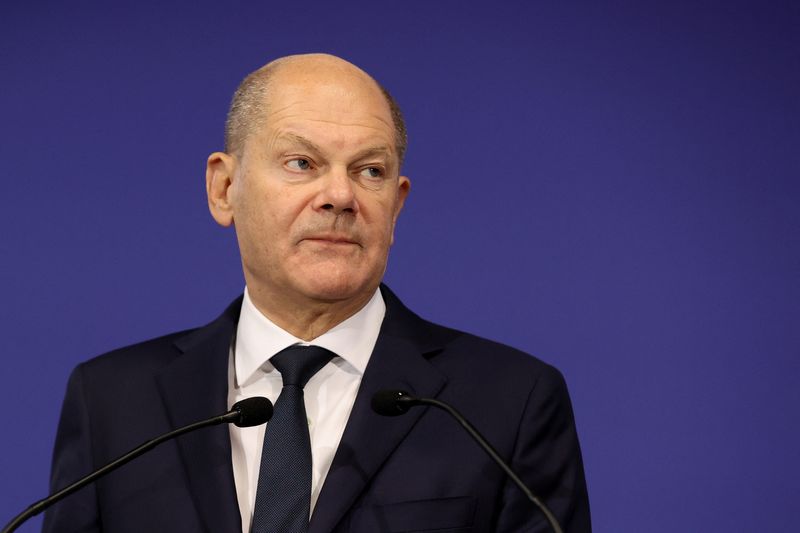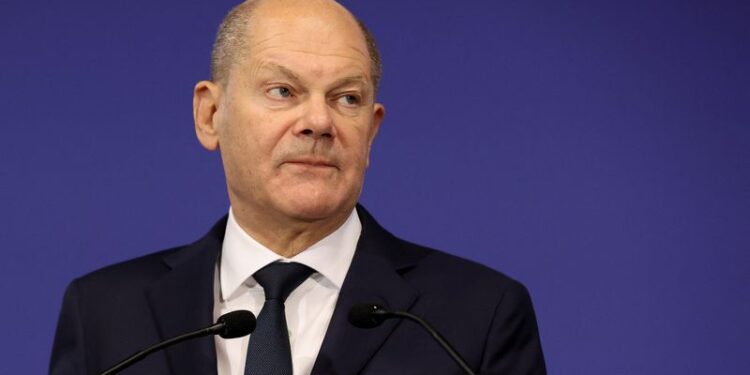By Yoruk Bahceli, Samuel Indyk and Danilo Masoni
LONDON (Reuters) – The collapse of Germany’s government could have a silver lining for the euro zone’s ailing economy with potentially higher spending likely to support its currency and stock markets, even if the path remains uncertain.
Markets are already moving in anticipation of more government borrowing that would help stimulate the economy, pushing a closely-watched bond market gauge of debt issuance to a record.
One reason for the collapse of the ruling coalition was disagreement on whether to suspend Germany’s debt brake, which limits borrowing, and the early read out from markets is that fresh elections in February could bring more certainty for an economy that just dodged recession.
German stocks outperformed European peers on news that the government collapsed last Wednesday, another sign of a more positive mood taking hold – just hours after Donald Trump’s U.S. election win raised the threat of tariffs in a fresh blow to Europe’s biggest economy.
“The German growth dynamic has been anaemic and a large part of that has been self-inflicted as Germany has stuck with the debt brake at a time when the economy needs support,” said Zurich Insurance Group (OTC:)’s chief markets strategist Guy Miller.
“The collapse of the coalition is constructive and we hope there could be more fiscal leeway in the 2025 budget.”
DEBT BRAKE DILEMMA
Economists have long blamed the debt brake, adopted in 2009, for holding back Germany’s economy, which is expected to shrink this year.
A rise in government spending by 1% to 2% of output for 10 years could boost potential growth to at least 1% from around 0.5% currently, ING’s head of global macro Carsten Brzeski estimates.
“Germany is not in any public finance problem,” Brzeski said, as given debt at just 63% of output, it has more room to spend than peers like France and Italy.
“If you can combine reforms with looser fiscal policies, please do it,” he added.
The International Monetary Fund has also said Germany should consider easing its debt brake and any signs that higher spending is coming could bolster European shares.
The pan-European is up just 6% this year, less than a quarter of the U.S. ‘s 26% gain.
Hopes of a pro-growth policy turn “would be much needed for German equity valuations to re-rate,” Barclays (LON:) reckons.
Citi expects tax cuts proposed by the conservative opposition Christian Democrats, leading the polls, would support equities.
The euro, which fell to its lowest since April around $1.06 on Tuesday, with talk of a drop to parity resurfacing as tariff worries weigh, could also benefit.
Societe Generale (OTC:)’s chief FX strategist Kit Juckes notes that Germany overtook Japan this year as the country owning the most foreign assets, meaning it has plenty of capital that could be used to invest in its own economy.
Such money “could be used to buy high-yielding German government bonds to get the economy moving,” Juckes said, adding that could eventually have a “big impact” on the euro if the government signals a material change to its policy approach.
The hope is a German policy turn could also open the door to more joint European spending. Trump’s election may require the bloc, which already faces calls for massive investments to boost competitiveness, to increase defence spending.
“A change in tone at the top in Germany is essential to move toward greater European integration,” said Gilles Guibout, head of European equity strategies at AXA Investment Managers.
He called the sacking of finance minister Christian Lindner, a fiscal hawk, “great news” for Europe, but added whether it will prove enough remains to be seen.
HOLD ON!
For sure, political uncertainty means more near-term pain for industry and could hurt sentiment.
The conservatives, tipped to lead the next government, may limit how much spending could rise. Their leader Friedrich Merz wants to stick with the debt brake.
To discuss reform he wants to see the right conditions to invest in pro-growth programmes, but also control welfare spending. He has also opposed further common European Union debt.
Economists are debating whether the debt brake itself could see reform or whether Germany could launch fresh off-budget spending, tough asks requiring a large majority in parliament.
Goldman Sachs expects the conservatives would only support amending the debt brake for modest additional spending, around 0.5% of output, expecting fiscal policy to remain a “drag” on growth.
Macquarie strategist Thierry Wizman recommends betting against the euro with no guarantee of a reformist government.
For others, change is a matter of time.

Davide Oneglia at consultancy TS Lombard expects snap elections to bring debates on Germany’s growth model and EU security risks “to the fore in all their urgency”.
“The main risk to our view is that they fail to grasp the need of a paradigm shift and fall back on old, now unviable, economic recipes,” he said. “A still harsher reckoning would then come for the German and EU economy.”






